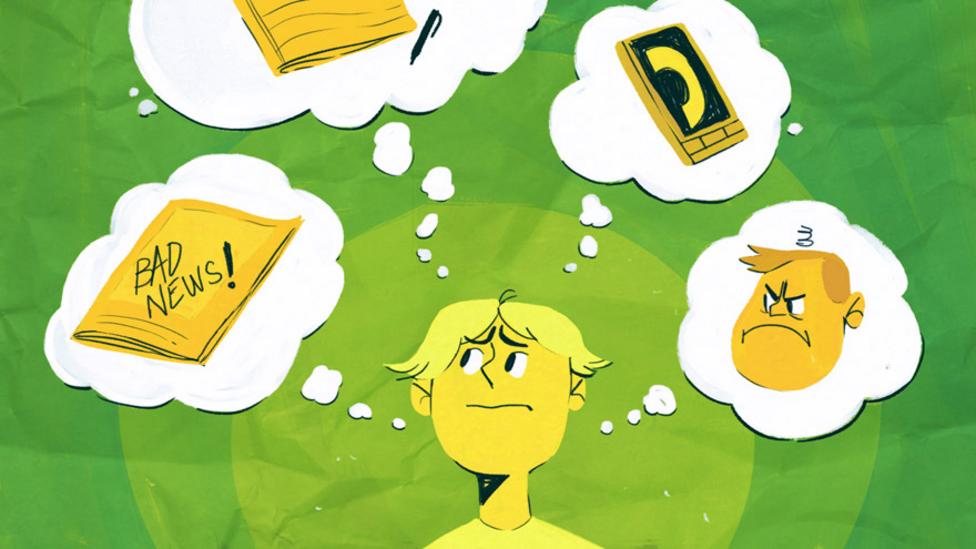Help me out - feeling anxious
Find out more about feeling worried or anxious.

Everybody worries
ItвҖҷs completely normal to get stressed and worry about things, especially as we never quite know what lifeвҖҷs going to throw at us.
Stress is your body's natural reaction to danger. Physical symptoms, such as being more alert or having a racing heart, were useful for our ancestors, allowing them to run away from danger or stay and fight. Nowadays we still have those same reactions but we worry about different things.
The trouble is when we have a BIG worry reaction to something thatвҖҷs not as dangerous as we think. For some that may be something like standing up and speaking in public, going to take an exam, meeting new people, or feeling like weвҖҷve done something wrong. Sometimes we get stressed out by friends, family members, or a teacher вҖ“ and then we worry about that.
We all worry, but anxiety is when worries take over, or are out of proportion to the real danger. Being anxious can make little things seem massive, so itвҖҷs important to try to do something about it.
Dr Aaron explains why we get stressed out
How does anxiety feel?
Increased heart rate and shallow or fast breathing
Sweating and shaking
Tension in your muscles (tight shoulders, clenching jaw, etc.)
Churning stomach
Feeling nervous and tense most of the time
Thinking worrying thoughts over and over in your head
Trouble concentrating
Inability to sleep and to relax
Feeling isolatedВ
WeвҖҷre not in control of everything that happens to us, but we are in control of how we react. Here are our tips for dealing with stress and anxiety...
Treat yourself well
Looking after your physical health does impact on your mental health. So eat a balanced diet, try and sleep well and get some exercise. When feeling anxious avoid caffeinated drinks and sugary foods. If you can get out and walk in the fresh air, itвҖҷs a great way to clear your head.
Be calm
When weвҖҷre anxious everything feels intense and fast вҖ“ the trick is to slow things down. See if you can notice when you start feeling stressed and take some time out and chill. There are lots of ways of calming yourself down вҖ“ listening to music, walking, meditation techniques. If you find youвҖҷre already stressed out, sit down, shut your eyes and slow your breathing down for a few minutes. For those few minutes try and calm yourself. Instead of thinking how scary or awful something is (or might be), reassure yourself that you can cope with whatever happens, and you will get the help you need to do that.
Chavala's tips for feeling less anxious
Think worries through
When your worries seem overwhelming, try and get them into perspective. This isnвҖҷt easy but it really helps to think things through or, talk them through with someone you trust. Often itвҖҷs our beliefs that worry us more than the actual things, train yourself to re-think your beliefs so you donвҖҷt have to worry as much.
Write it down
Sometimes writing your worries down can help reduce fear. Write down what your actual worry is in a column вҖ“ in the next column test it. Ask questions like:
How likely is that to happen? (What are the chances? Am I blowing it up in my head?)
Have I got all the facts right? (What am I missing? Am I assuming something that wonвҖҷt be true?)
How awful would it be if it DID happen? (Am I underestimating how I might cope? Am I making this thing out to be like the end of the world when itвҖҷs not?)
Who can I get to help me through this?
By asking questions like these, we put our worries into perspective, and then we can deal with them better.
You could also try making a list of your negative thoughts and then try rewriting them as positive thinking.
Talk to someone
If you feel that your worries are getting on top of you then speak to someone you trust. Whether itвҖҷs a parent or guardian, a teacher or friend, talking things through and expressing your fears can really help.
For information about organisations which can offer more advice on a range of issues, check out the advice helplines page.
Want to know more about different emotions? Try the Lifebabble guide to feeling good.